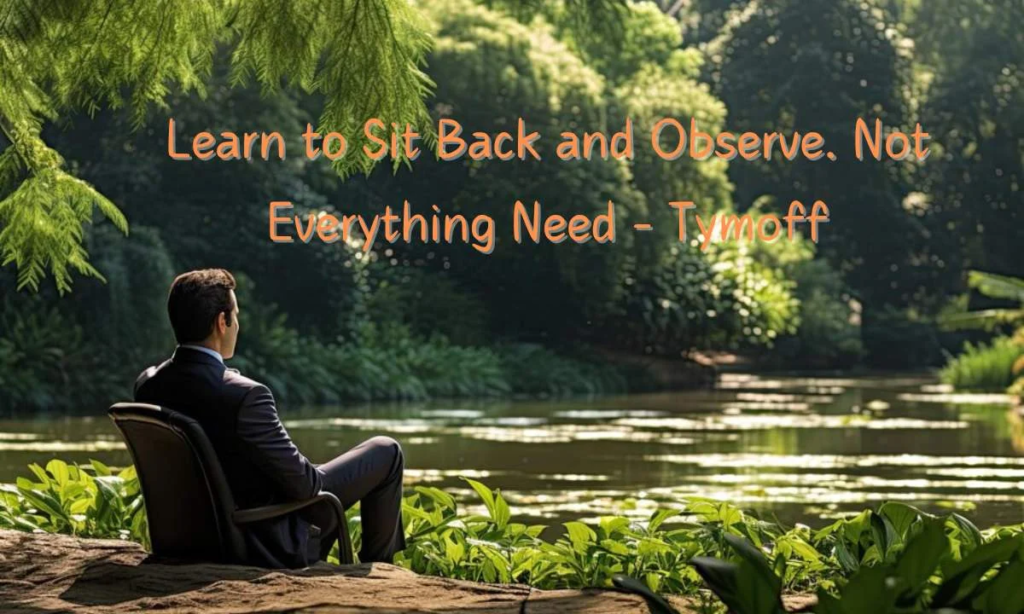In our fast-paced, action-oriented world, the ability to pause, observe, and reflect is becoming increasingly valuable. This article will delve into the significance of patience, the art of observation, and the understanding that not every situation requires immediate action. The focus keyword “learn to sit back and observe. not everything needs – tymoff” encapsulates this philosophy perfectly. By embracing this mindset, we can foster better decision-making, enhance our mental well-being, and improve our interpersonal relationships.
The Power of Patience
Patience is often perceived as a passive quality but a powerful force that can drive substantial personal and professional growth. Cultivating patience in a culture that prizes instant gratification allows us to stand out and achieve long-term success.
When we learn to sit back and observe, we practice patience. This deliberate pause helps us to process information more thoroughly, consider different perspectives, and make more informed decisions. During these moments of quiet observation, we can truly understand the complexities of a situation and respond more effectively.

The benefits of patience extend beyond decision-making. It also contributes to our mental health by reducing stress and anxiety. When we rush to react to every situation, we place unnecessary pressure on ourselves, leading to burnout. Patience helps us to manage our expectations and maintain a calm and composed demeanor, even in challenging circumstances.
The Art of Observation
Observation is a skill that requires mindfulness and attention to detail. It involves taking a step back from the immediate action and assessing the broader context. By observing, we can gather valuable insights that might be overlooked in the heat of the moment.
Learning to sit back and observe cultivates a mindset of curiosity and open-mindedness. It means being present in the moment and fully engaging with our surroundings. This practice can be particularly beneficial in our relationships. By observing the actions and reactions of others, we can gain a deeper understanding of their needs and emotions, leading to more empathetic and effective communication.
In the professional realm, observation is a critical component of strategic thinking. Leaders who take the time to observe their team, market trends, and competitive landscape are better equipped to make sound decisions. They can identify opportunities and threats that others might miss and can develop strategies that are both innovative and grounded in reality.
Understanding That Not Everything Needs Action
One key lesson in learning to sit back and observe is recognizing that not every situation requires immediate action. Sometimes, inaction is the best course of action. This cannot be easy to grasp, especially in a society that values productivity and constant movement.
However, taking a step back and allowing events to unfold can often lead to better outcomes. It will enable us to gather more information, reflect on our options, and choose the most effective response. This approach is instrumental in conflict resolution. We can avoid escalating the situation by not reacting impulsively and working towards a more thoughtful and peaceful resolution.
Moreover, understanding that only some things need action helps us to prioritize our efforts. We learn to focus on what truly matters and let go of trivial concerns. This selective approach to action can increase our efficiency and ensure that our energy is directed towards meaningful pursuits.
Practical Tips for Cultivating Patience and Observation
Developing the ability to sit back and observe requires practice and intentionality. Here are some practical tips to help you embrace this mindset:
- Practice Mindfulness
Mindfulness involves being fully present in the moment and observing your thoughts and surroundings without judgment. Practicing mindfulness can enhance your observational skills and develop more extraordinary patience. Techniques such as meditation, deep breathing, and mindful walking can help you cultivate this practice.

- Slow Down
In our busy lives, slowing down and taking a step back can be challenging. However, slowing down is essential for observation and reflection. Make a conscious effort to reduce your pace by simplifying your schedule, reducing multitasking, or taking regular breaks throughout the day.
- Reflect Regularly
Set aside time for regular reflection. This can be done through journaling, meditation, or simply sitting quietly and thinking about your experiences. Reflection helps you to process information, gain insights, and develop a deeper understanding of yourself and your surroundings.
- Listen Actively
Active listening involves entirely focusing on the speaker, understanding their message, and responding thoughtfully. By practicing active listening, you can improve your observational skills and build stronger, more empathetic relationships.
- Embrace Uncertainty
Learning to sit back and observe means becoming comfortable with uncertainty. Accept that you don’t have to have all the answers immediately and that waiting for more information is okay before making a decision. Embracing uncertainty can reduce anxiety and help you to make more thoughtful and informed choices.
- Seek Feedback
Feedback from others can provide valuable insights that you might miss on your own. Seek feedback from trusted friends, colleagues, or mentors to gain different perspectives and improve your observational skills.
Conclusion
In conclusion, the ability to sit back, observe, and recognize that not everything needs action is a powerful mindset that can lead to tremendous success and fulfillment. By embracing patience, honing our observational skills, and understanding the value of inaction, we can navigate the complexities of life more effectively.
The focus keyword “learn to sit back and observe. Not everything needs—tymoff” reminds us of this valuable lesson. As we move forward into 2024, let us strive to cultivate this mindset and reap the benefits it offers in our personal and professional lives. Embrace patience, observe with curiosity, and remember that sometimes, the best action is no action.


